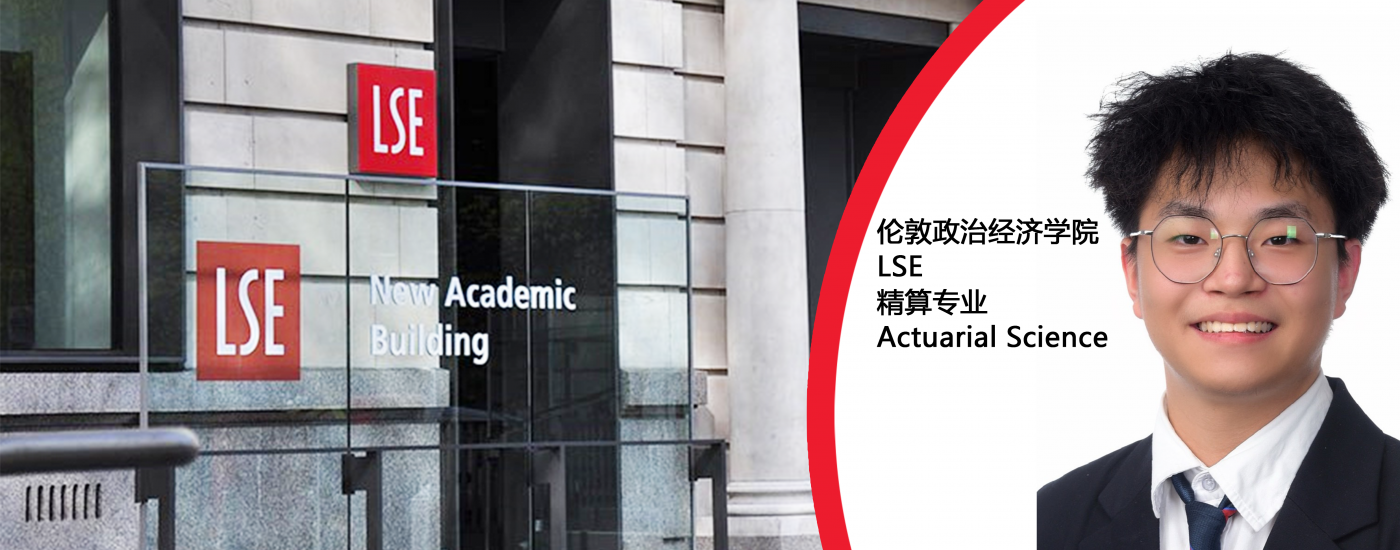Atticus W: Majoring in Actuarial Science @LSE

After receiving the very first offer of the class of 2024, Atticus W went on to receive offers from more top universities, including an offer from his dream school, LSE, to study Actuarial Science. For Atticus, mathematics is more than just a passion; it is the bridge to his dreams. After scoring full marks on the Zhongkao math test, how did he continue to shine during his high school years? And how did he transform his enthusiasm into a career plan in actuarial science and aviation? His story is filled not only with hard work and wisdom, but also a passion for flight. Let's delve into Atticus's story.
Atticus W (Y13)
LSE - Actuarial Science
UCL - Mathematics
University of Manchester - Mathematics
The University of Hong Kong - Mathematics
Maths Genius’s Unique Path to an Aviation Dream
Atticus's decision to study mathematics stems from his passion and aptitude for the subject. After achieving a perfect score on the Zhongkao mathematics exam, he continued to excel at DHSZ. Within the school, he represented the Mandela House in mathematics competitions, taking on team projects and winning first place for two consecutive years. Beyond the school, he has also earned numerous achievements, including being in the top 1% globally on the AMC12, scoring an 8 on the AIME (equivalent to the top 1%), ranking in the top 25% on the Euclid, and winning gold medals in the SMC and IMC.
When applying to his dream school, LSE, Atticus chose to pursue actuarial science. "I believe the difference between mathematics and actuarial science is that mathematics is about solving abstract problems, whereas actuarial science involves applying mathematical methods to real-life situations, such as making predictions through data analysis. It's more application-oriented," he explained. Although actuarial science is a relatively niche field, Atticus sees it as highly useful because it can help companies reduce waste and increase profits.

Regarding his future career plans, Atticus has a clear vision: to work as an actuary in the aviation industry. Atticus has had a deep fascination with aviation since childhood. "I really enjoy flying on airplanes and experiencing the sensation of soaring through the sky, gazing at the landscapes below. When I go home, I often bring a drone because the rural environment around my hometown is perfect for flying. Sometimes, I even capture the entire village from a bird's-eye perspective so I can take in this charming perspective." In addition to hands-on flying experiences, Atticus is also passionate about flight simulation games. By role-playing as a pilot, he can learn professional aviation terminology and landing procedures, as well as simulate the driving experiences of various aircraft models. "At times, I even choose flights with higher prices or longer routes just to personally experience the unique characteristics of different aircraft." Even if he cannot realise his dream of becoming a pilot, Atticus still hopes to continue working in the aviation industry in another capacity, such as designing more efficient routes and selecting more suitable aircraft models through his expertise in actuarial science, seamlessly blending his interests and career aspirations.

Grow in Dulwich - Introvert Version
At DHSZ, Atticus received a lot of support for learning mathematics. The mathematics-related co-curricular activities (CCAs), scholars programme, and a rich selection of courses like economics all provided him with extensive resources and opportunities. Within the scholars programme, Atticus gained insights beyond just textbook knowledge, including new ways of thinking and problem-solving methods, which he applied to his interview at the University of Cambridge.

In addition to academic support, Atticus's four years of study at DHSZ significantly enhanced his various soft skills. Firstly, his interpersonal skills improved tremendously. As he described, "If the maximum extroversion level is 10, I was probably only at 1 in middle school, but at DHSZ, I reached 6-7." The school's abundant activities and moving from class to class allowed him to interact with a wider group of peers and teachers, rather than being confined to a familiar small group.
Secondly, his language proficiency also saw a notable improvement. Frequent communication with foreign teachers helped Atticus become more adept at expressing his thoughts in English. He was introduced to perspectives beyond China’s and gained a more expansive worldview and understanding of diverse ways of thinking shaped by different cultural backgrounds.

Atticus believes that DHSZ's educational philosophy, which emphasises allowing students to explore independently, suits him very well. He can independently manage his time thus better achieve his learning goals.
The Path to Higher Education: Methodical Preparation is Key to Mastering It
Starting in Year 11, when Atticus began preparing to apply to universities, he carefully researched all the schools in the UK and immediately set his sights on LSE as his target. "I like places with a strong academic atmosphere, and I'm also very fond of the culture and learning environment in the UK," he said.
After determining his goal, Atticus began methodically planning his path to higher education. In addition to various competitions, he also attended summer schools at the University of Cambridge, Harvard, and the University of Hong Kong to accumulate diverse experiences. He dedicated himself to excelling academically in the exams. He then invested time in preparing his personal statements, as he was aware of LSE's emphasis on the importance of these materials. Atticus spent two months meticulously revising his statements through multiple drafts until he and his counsellor were satisfied. He joked that, "I even chose an auspicious day to submit it - October 1st, China's National Day."
Atticus believes the highlight of his statement was his account of a discovery he made during the Hong Kong University summer school. "At the start of summer school, the professor mentioned the Euler's formula. At the time, this content had not yet been covered in our school's curriculum, but I was very interested, so I explored it on my own. Through my own calculations and discussions with classmates, I was eventually able to derive the formula. This experience was very fascinating."
Atticus's counsellor, Mr John Coffey, provided him with tremendous support his selection of schools and majors, as well as statements preparation. Mr Coffey also closely monitored Atticus's academic results and IELTS scores. He praised Atticus's academic performance and extracurricular achievements, "From the outset it was evident to me that Atticus’s ability and interest in mathematics, coupled with an equally impressive work ethos, meant that he would be well organised and ahead of the game in the race to completing application tasks. University applications are stressful and hard work and it’s important that students learn to focus, plan, and assimilate all this extra work into their daily and weekly timetables and Atticus excelled at this."
Advice for Lower School Students
First, I want to emphasise the importance of starting to plan early. Whether it's choosing a major, selecting summer schools, or preparing for university applications, if you wait until Year 12 to start considering these things, it will be too late.
Secondly, while preparing thoroughly, it's crucial to balance work and rest. Reflecting on my IELTS preparation experience, I spent the entire week just studying without any breaks, which left me feeling very fatigued. In contrast, when preparing for the major exams, I made sure to give myself time to relax each day, and this actually improved my studies.
In summary, early planning and reasonable scheduling of work and rest are extremely important. Only by doing so can you achieve a good balance between your studies and your life.






